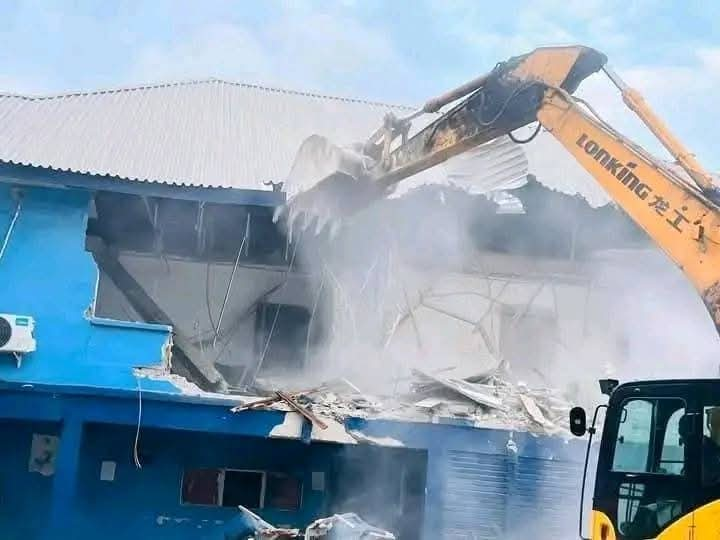By Festus Poquie
In the early light of Tuesday, a quiet vigil took shape at the ruins of Liberia’s Congress for Democratic Coalition headquarters, a stark reminder of a political clash that has drawn deep lines through the capital.
Members of the Coalition for Democratic Change (CDC), Liberia’s main opposition bloc, gathered at the damaged remains of their party’s former nerve center, kneeling and offering prayers for their political leader, George Manneh Weah, the former FIFA star who led Liberia from 2018 to 2024.
The scene was a blend of youth and elder women, a testament to the broad spectrum of the party’s supporters. Some of the participants were in their mid-60s and early 70s, while younger volunteers—some in their teens and twenties—stood nearby, lending their voices to a ceremony that felt both ritual and political.
As prayers filled the morning air, the attendees directed their invective toward those they blame for what they described as the persecution of the party and the destruction of its national headquarters.
They named President Joseph Boakai, his vice president Jeremiah Koung, and Inspector General of Police Gregory Coleman as joint targets of their ire.
The gathering was marked not only by lament but by a clear sense of resolve: to seek strength for Weah and to denounce what they see as political persecution.
For more than 20 years, this place has been their home, but a family dispute exploited by a sitting government marshalled by the party’s archenemies has left them internally displaced.
In sorrow, these women gathered at the demolished CDC headquarters site to pay homage and voice political longing.
“Many things took place during the days of old,” one elder participant remarked, weaving a narrative of national history into the present moment. The words carried a sense of both caution and defiance, a reminder that Liberia’s political theater remains deeply personal for many families and communities.
In a moment that threaded faith and politics together, a speaker identified as Mother Rebecca Vah—who spoke with the cadence of a sermon—led a declaration that the President and his officials who have rendered their party homeless would be trapped in “the red sea” with divine intervention.
Her words, spoken in a weighty, iterative rhythm, invoked biblical imagery as a symbolic path to collective strength.
“George Manneh Weah stand strong because you’re God’s servant,” she proclaimed. “You have the fear of God. You have done a lot of good things for this nation, but it shall be cursed to the evil people.”
The lament turned toward the three named leaders, with a pronouncement that they would “vanish”—a blunt, if emotionally charged, element of the ritual’s rhetoric.
“You know many things took place during the days of old. As King Pharaoh got behind the Israeli, they left in the red sea.
“I declare and decreed as the people get behind us, they shall be left in the red sea in the name of Jesus.
‘Victory for George Manneh Weah. God will make him strong. My name is Mother Rebecca Vah. I am speaking like the servant of God. As I speak this place in the name of Jesus shall be a dead place in Jesus’ name.
“George Manneh Weah stand strong because you’re God’s servant. You have the fear of God. You have done a lot of good things to this nation, but it shall be cursed to the evil people. It shall be cursed to Jeremiah Koung. It shall be cursed to Joseph Boakai. It shall be cursed to the so-called Gregory Coleman. They will vanish. This is their end in Jesus’s name.”
The ceremony continued with communal prayer, a chorus of voices lifting petitions for the ex-president’s continued strength and blessings on leadership. “Let your world stand still,” the speaker prayed, calling for divine steadiness during a period of political upheaval.
The sermon concluded with a plea that George Manneh Weah be strengthened as “the son of God,” and that he be blessed more and more.
“Let us prayer:
‘So, father in the name of Jesus, Lord as I decreed and declare, let your world stand still. I want you to strengthen your son George Manneh Weah because he is the son of God. I want you to bless him more and more.”
Some critics called the CDC members idol worshippers. For observers, the gathering at the ruined headquarters raises questions about how Liberia’s political culture blends devotion, memory, and contest. The site of the old CDC headquarters stands not only as a physical remnant of a once-active political hub but as a symbol of the shifting allegiances and the enduring passions that power Liberia’s democratic process.
Beyond the immediate headlines, the event offers a touching glimpse into how communities interpret leadership and accountability in moments of loss and renewal.
The women who spoke—some in the strength of late middle age, others in the vigor of youth—carried with them a legacy of care and concern for Liberia’s future, anchored by politics, faith and a conviction that political fortunes can be redirected, even in the face of demolished symbols.
As the day progressed, the site settled into a quiet residue of rubble and resolve. People began to disperse, others fetching for survival from debris, while leaving behind a scenery that had become a stage for prayers, memories, and political expectations.
For many, the day’s proceedings were less about retribution and more about reaffirming a shared hope: that leadership grounded in service and faith can guide Liberia toward a future they insist remains within reach.
The demolished headquarters, now a memory, will be remembered as a moment when faith, family, and politics converged on a single, broken site—yet with a resolve to rebuild, both physically and politically, from the ashes.


